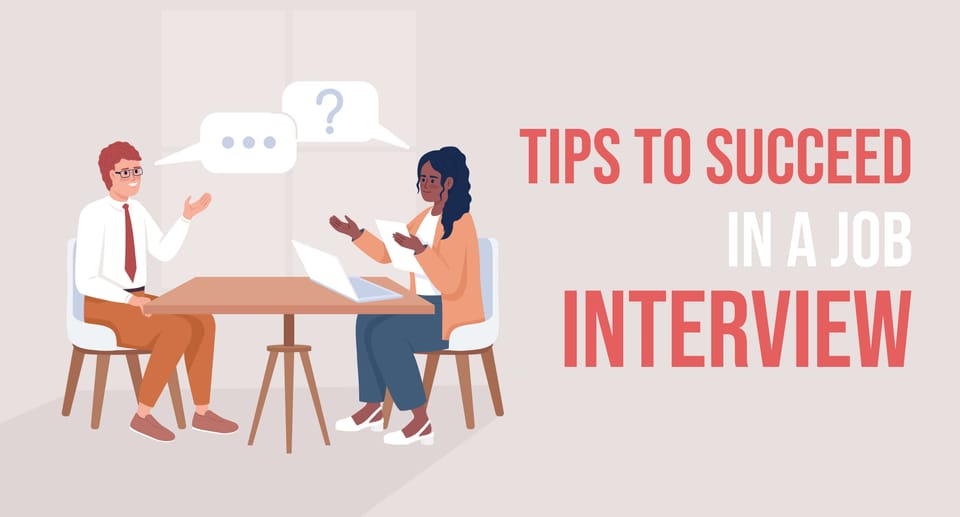5 Successful Interview Tips: Key Tips to Succeed in a Job Interview

Millions of jobs are posted online but it's difficult to crack one. This is the thought that strikes our mind when you start looking for a job. Job hunting is a painful process, but if thought well, strategized, and acted upon mindfully, it's not that difficult as well.
1. Interviews and rejections go hand in hand
Let's start with the most disappointing part of the interview process, Rejection. As a job hunter, the most crucial part is understanding two employers turning down your application is not the end of the road. The first step of job hunting is to understand the potential employer.
There are two categories of employers, the first category is of large size employers like fortune 500 and then small employers like, a startup that are well funded and with great idea and growth potential.
The chances of reaching a decision-maker in a small organisation is high. While you may have an aspiration to join an MNC, it does not hurt to do some practice interviews, gather a few offers and have some more confidence before you apply for bigger organisations.
2. Always prepare for interviews before appearing
Be it one interview or a series of interviews, always go prepared and well-informed for the interview. As a job seeker, you may tend to believe, that the interview is to gauge you well and evaluate your capabilities. While it's a process to know the jobseeker well but major purpose of the interview is defeated if you end up unaware of the organisation and their product or services.
Organisations don't want to waste their time interviewing random people who might not have a genuine interest in the organization. A job is more than a role and package it brings. You are being hired to solve a problem and a jobseeker appearing for the interview without research is a sure-shot reason for the rejection. So if you have an upcoming interview. Google the, check the interviewer's LinkedIn profile. Read media reports and keep your queries handy. It will showcase you as a genuine jobseeker with a real interest in the opportunity.
Skipping this one step will make a major difference.
3. Interview for a job is like a dating
The interview should not be compared with a marketing activity. Its an opportunity for both the parties to evaluate their compatibility. The interview is a data-collecting process for the employer and employee. They are evaluating through a lens of questions like - We like you?
Do you want to work here?
Do you have the skills, knowledge, or experience that we really need?
Do you have the work ethic that we are looking for?
And how will you fit in with other employees?
The same questions should be there in your mind as an employee. Do I want to work here or not?
Never start your interview by marketing your skills and knowledge. Not until you have made your mind, if this is your next employer.
4. Determine to observe a 50-50 Rule
Studies have revealed that people who get hired are those who mix speaking and listening 50-50 in the interview. What is the 50-50 rule, it's a thumb rule that half of the time you let the employer do the talking, and half the time jobseeker does the talking. As per the study, those who talk too much about themselves, come across who would ignore the needs of the organizations. If you talk too little, you may but trying to hide something about your background. So the best part is to take the middle path and speak as much which does not make you leave a bad impression. Come across a genuine jobseeker, share your strengths but don't brag. Don't make unnecessary non-verbal gestures too. Smiling too much shows your anxiety. So be mindful of your verbal and non-verbal communication.
5. The employer wants to filter out any wrong hire
During the interview a jobseeker is nervous, what will be the outcome. But reality is not different for the employer, they are anxious they should not hire anyone
- Who lacks the necessary skills?
- That its not a stop-gap Job for you and you will keep looking for other opportunities.
- That you won't fit culturally
- That you will do the least expected from the job, rather maximum that the manager is expecting from you
- That you will always have to be told, what do to next rather than display initiatives.
Job Hunting is no magic, no techniques will work all the time. There are times when the interviewer has already hired somebody but they want to finish meeting 5-7 people before they put it across the management that they have hired the best. So whatever is the outcome of the interview, we have to invest ourselves in every interview. We have to be mindful, prepare our strategies well, and do our research. So while you appear for the interviews, reflect on the mistakes you made earlier. Take the learning and move forward. Rejections are only to be taken in stride and move on. Repeat the process well, before you land your dream job.
Read more:
